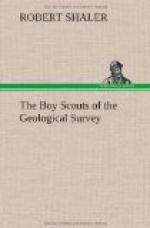THE GOLDEN FEATHER
“This was a pretty fair catch, for a change,” thought Ralph Kenyon, as he tied the limp animal to his pack-saddle, and reset the trap, hoping next time to catch the dead mink’s larger mate. He ran a quick, appraising eye over the load slung across Keno’s broad back. “Pretty good, eh, old boy?” he added aloud, stroking the velvety nose of his dumb companion on many a solitary hunt. “Now, Keno, you hang around, and browse on these young cottonwoods, while I do some figuring. I want to see what I’m likely to get for this next shipment of pelts.”
The old horse, nothing loath, obeyed his young master’s behest as promptly as though he had fully understood the words. Meanwhile, Ralph found a mossy spot on the shady side of a big gray, lichen-covered boulder, and, seating himself thereon, with his back comfortably adjusted to a depression in the rock, he drew a worn account book from a pocket of his corduroy coat. Moistening his thumb he began to turn the pages rapidly, until he came to the place where he had made the last entry in his accounts. With a stubby pencil, which he had taken from another pocket, he jotted down the new items:
“So far, one mink, six coon, three skunk, a gray fox, and seventeen rabbit skins. All told it ought to bring—–let me see.” He relapsed into silence, as he estimated the total, and then he sighed deeply. “Not very much,” was his inward comment; “not anywhere near enough!”
Ralph felt that it was high time that he brought to a close his season’s operations with trap and gun. The spring was unusually early this year, and the fallow truck patches were fairly clamoring for his attention. Yet he was reluctant to abandon his winter pursuit of pelts and to return to the sterner and less thrilling labor of ploughing and planting and peddling vegetables.
Not that he was averse to hard work—–far from it! Ralph Kenyon was as industrious, energetic, and sensible a young fellow as one would wish to know; yet, being a very average, normal lad, and at that age when love of freedom and adventure is foremost, he naturally preferred the varied life of a huntsman and trapper—–even though his field of activity was not extensive—–to the moiling occupation of a market gardener.
On the other hand, there were times when he thoroughly enjoyed the labor of wresting a livelihood from the soil, and he took pride in raising the choicest products that could be offered for sale. Such spells were most frequent in midsummer, when all nature was in a placid mood for growth; but in autumn and spring came livelier hopes and a stronger call to this lad, and in his own way he set about accomplishing the chief aim of his life, the great end to which these winter pursuits were but a means.




